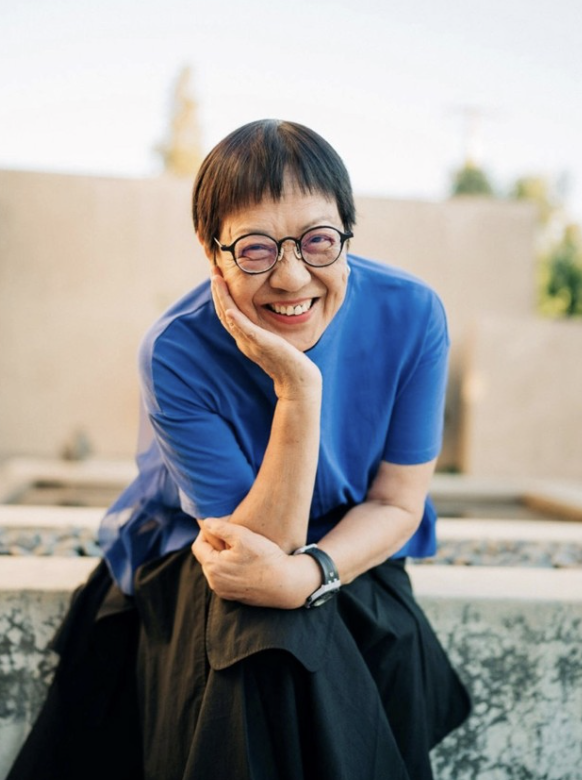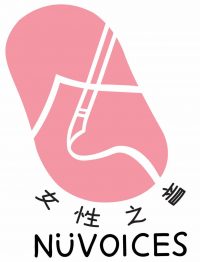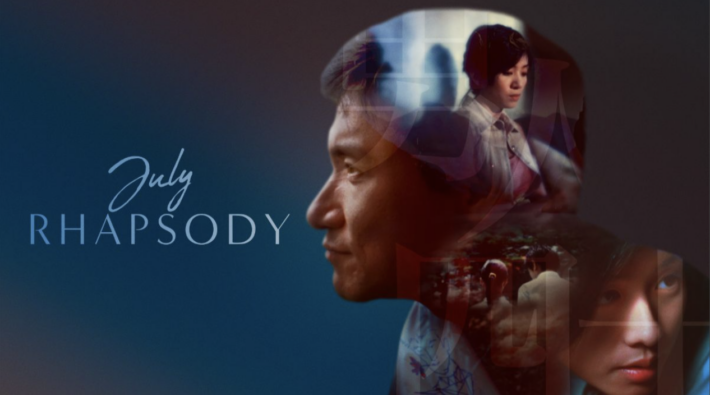BY DAISY SINGH GREAVES
“This is my Dad. Whenever someone says they think we’re alike, he says, I don’t want him to be like me. He seldom tells stories. When we were young, he used to read us Chinese poetry. But today, he suddenly starts to tell a story.” – Lam On-yin, July Rhapsody
July Rhapsody, also known as Man, 40 ( 男人四十) is a richly contemplative exploration of a man suddenly finding himself at a personal and professional crossroad. This Hong Kong drama, directed by leading Hong Kong new wave filmmaker Ann Hui (Boat People, A Simple Life) and scripted by Ivy Ho (Comrades Almost a Love Story), revolves around Lam Yiu-kwok (Jacky Cheung), a secondary school teacher of Chinese Classical Literature as he grapples with a delicate turmoil of past regrets and present desires.
*Author’s note: Spoilers ahead
On the surface, Lam has a stable life, with a modest apartment, loving wife Man-ching (Anita Mui), and two sons. He teaches Chinese Classical Literature, which becomes a thematic undercurrent that serves as a vehicle for introspection and emotional expression. However, beneath this stability lies an internal struggle. Lam grapples with the stark contrast between his life and the affluence of his old classmates. Many now successful businessmen, they flaunt their wealth, further compounding his sense of inadequacy and financial stagnation.
Lam’s restlessness is fuelled when he captures the desires of Wu (Karena Lam), a charming and precocious student who makes no secret of her attraction to him. Her persistency challenges Lam’s steady demeanour and highlights his vulnerability. Eventually, his resistance weakens. He is drawn into a dance of temptation, depicted through lingering long shots that create an alluring yet uncomfortable intimacy, mirroring unresolved issues in his marriage that have shaped his current life. At the same time, their marriage takes a complicated turn with the arrival of Mr. Seng (Tou Chung Hua), Lam and Man-ching’s former teacher, and Lam’s mentor, who is now old and dying.
This event unearths old wounds and unresolved tensions, as we learn that Man-ching seduced Mr Seng in the past. Her decision to spend time with her former lover exacerbates the emotional distance between her and Lam, who is left to confront his own dissatisfaction. The situation also brings to the surface a long-buried truth: their first son, On (Shaun Tam), is actually Mr. Seng’s child – a truth Lam has long accepted but never discussed with the family.
The film’s appeal lies not in dramatic plot twists or overt sensationalism, but in its ability to evoke a sense of empathy, through flashbacks and restrained yet powerful performances from the cast. Cheung delivers a moving performance as Lam, capturing the quiet desperation and regret of a man confronting his own limitations. Mui brings a subtle complexity to her role of a woman caught between her past and present, complementing Cheung’s performance. Karena Lam also gives a captivating portrayal of Wu, capturing the character’s daring confidence and magnetism in a nuanced way.
July Rhapsody is a masterful blend of poetry, passion, and pain, offering a serene yet profound reflection on the human condition. Thanks to the delicate cinematography by Kwan Pun Leung, the film is imbued with a quiet beauty, employing long, contemplative shots and a poignant use of classical Chinese music and poetry to underscore its themes. This also serves as a backdrop to the personal drama. Often recited by Lam, classical poetry is used as a means of connecting with his wife and eldest son.
The film’s emotional honesty makes it a gem of turn of the century Hong Kong cinema. Offering a profound introspection on the complexities of life, love, and personal fulfilment, July Rhapsody will speak to anyone who has ever felt the weight of unfulfilled dreams and the challenge of reconciling the past with the present.
A winner of 3 Golden Horse Awards (2002); 3 Hong Kong Film Awards (2002); and a Hong Kong Film Critics Society Award (2002), July Rhapsody is in theatres in restored 4K from 19th July across North America. It will be available on DVDs on 10th September, and VOD on 1st October. Find out more from the Cheng Cheng films website.
About the filmmaker

Ann Hui (許鞍華) grew up in Hong Kong, where she studied literature before attending the London Film School. She won the Golden Horse Award for her first feature film, The Secret (1979). The Story of Woo Viet (1981) and Boat People (1982) both premiered at the Cannes Film Festival. The Romance of Book and Sword screened in the Berlinale Forum in 1988, followed later by invitations to the Competition for Summer Snow (1995) – awarded the Silver Bear for Best Actress – and Ordinary Heroes (1999). My American Grandson (1990), Stunt Woman (1996), Eighteen Springs (1997), July Rhapsody (2002) and Goddess of Mercy (2003) also screened at the Berlinale. In 2011, A Simple Life celebrated its world premiere in competition at the Venice Film Festival. Ann Hui has been honored six times at the Hong Kong Film Awards and three times at the Golden Horse Awards for Best Director.
About the author
Daisy Singh Greaves is a British writer and copyeditor for NüStories who also helps coordinate the NüVoices London Chapter. With a keen interest in East Asian politics, gender issues, and the environment, she has written for various media outlets. Currently based in Paris, Daisy leads the communications for a UNESCO-led international environment initiative. She holds a BA in Chinese and English from SOAS, University of London, and an MSc in International Relations from the University of Edinburgh, where she focused her thesis on generational foreign policy attitudes in Taiwan. Whilst studying for a year at Beijing Normal University, she volunteered with the Starfish Project, a charity supporting and rehabilitating trafficked women in East Asia. Since then, she has been passionate about elevating the voices of women and marginalised groups through grassroots journalism and storytelling.

